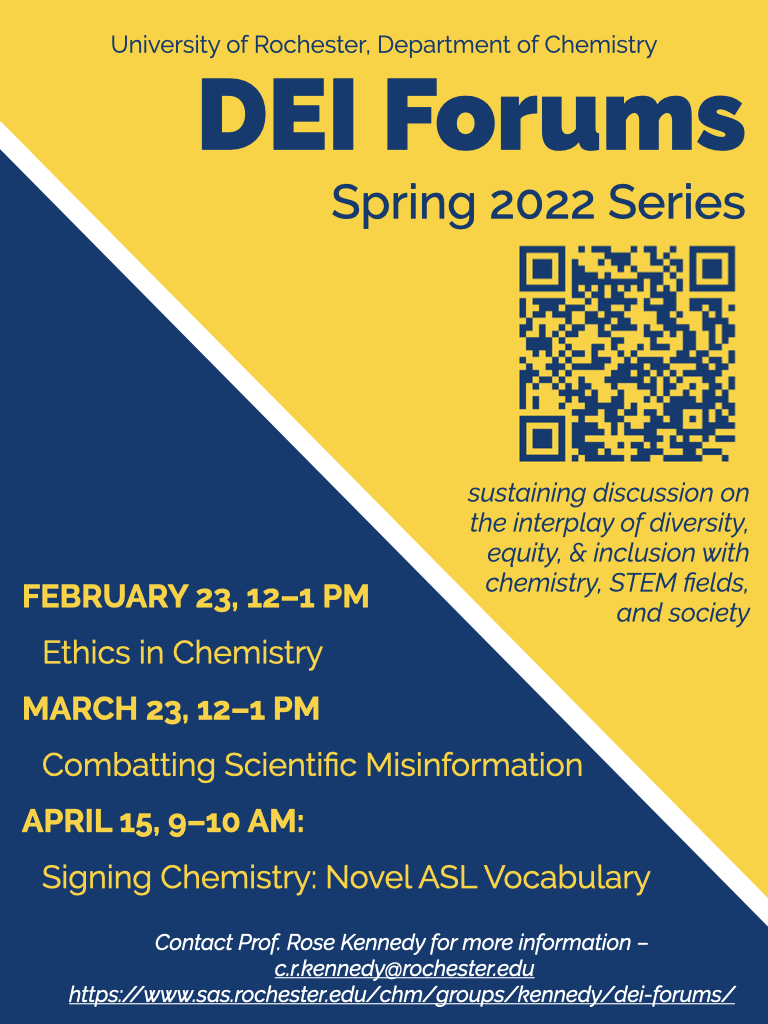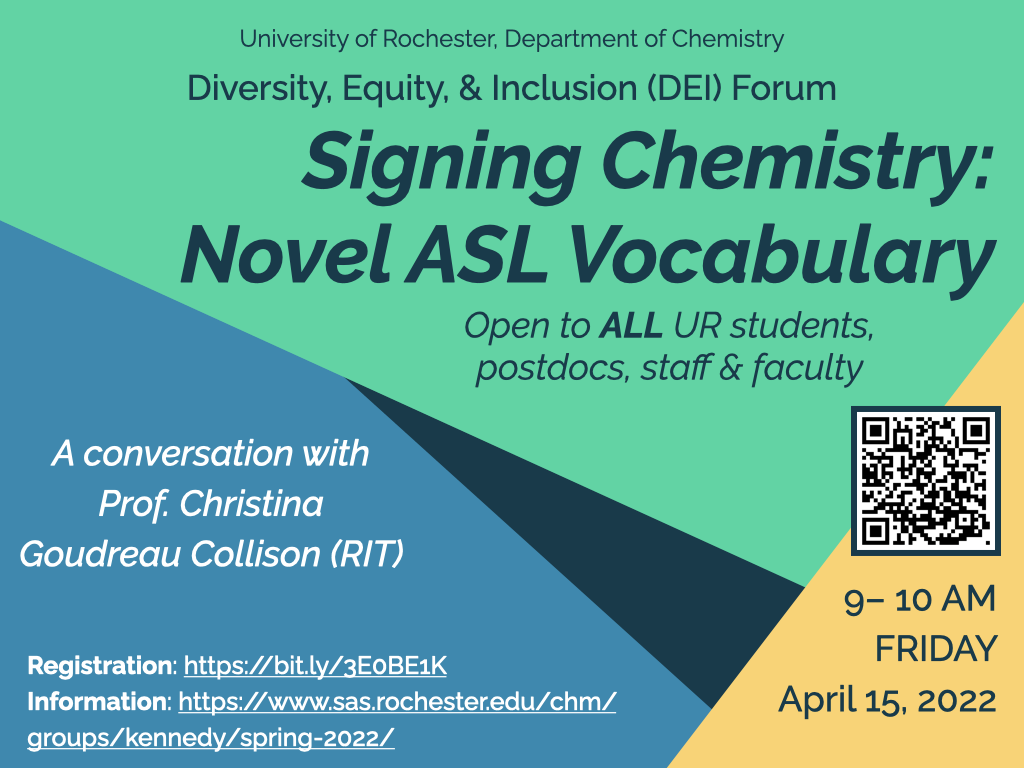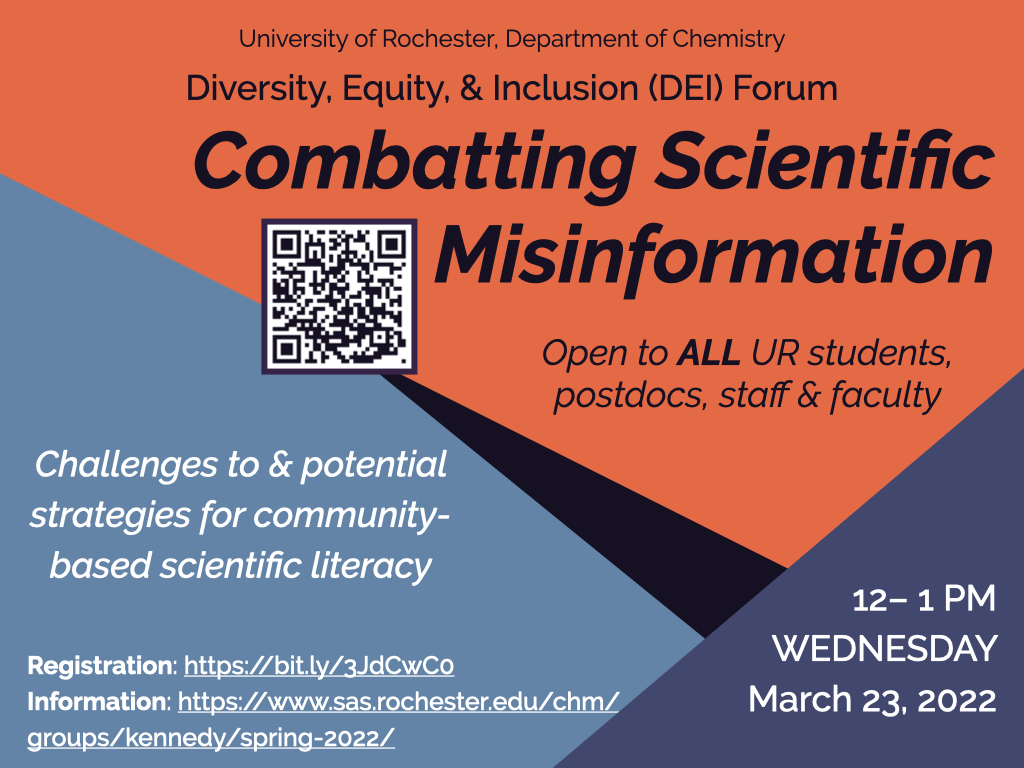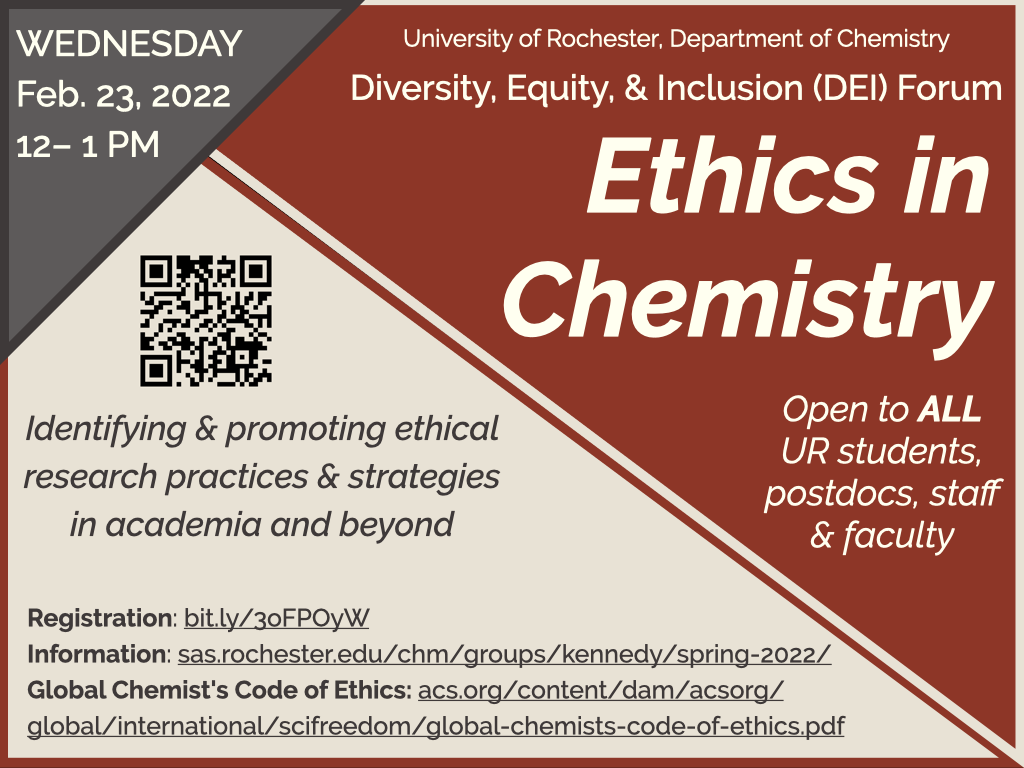One of the key priorities to emerge from the department’s 2021 DEI Days of Action was the need to sustain department-wide discussion of how multifaceted topics of diversity, equity, and inclusion relate to our department, the chemistry field, STEM disciplines, and society. Toward this goal, the DEI-O Committee is sustaining a continuing series of monthly DEI Forums. These forums will involve interactive, guided discussions based on articles, films, podcasts, or other media shared in the 1–2 weeks prior to each forum. These forums are open to all in our department community–including undergraduates, graduate students, postdocs, staff, and faculty.
In the spirit of Meliora, we hope that these forums will help to center DEI in our ongoing departmental conversations, growth, and pursuit of excellence. Please contact Rose at c.r.kennedy@rochester.edu. to volunteer to facilitate forums, to suggest future topics, and/or to provide any other feedback, questions, or comments.

The April forum (Friday, April 15th, 9–10 AM) will focus on Signing Chemistry with Novel ASL Vocabulary with special guest Prof. Christina Goudreau Collison (RIT), whose Chemistry Education research program includes Sign Language Incorporation in Chemistry Education (SLICE). A description from Dr. Goudrea Collison’s website
Rochester Institute of Technology is home to the National Technical Institute for the Deaf (NTID). Over the last decade, the organic team at RIT has recognized the inherent difficulties of learning organic chemistry specifically for those who are deaf (D) and hard of hearing (HH) . A complicated vocabulary and a lack of dedicated signs in American Sign Language (ASL) makes organic chemistry a challenge for D/HH students. Profound performance gains were observed after our team worked to develop, adopt and propagate a new sign language lexicon for organic chemistry terminology and, best of all, transition states by way of sign expansions. Now, the team is investigating if the same learning gains can be achieved if these signs are also taught to hearing students taking the course.
Please register for an individual Zoom link at: https://rochester.zoom.us/meeting/register/tJ0vfuirqD4pHtJJTSd8FLVSe7auuhqy1BxE
No preparation is required to participate in this forum, but we invite you to review this recent publication on the topic:
Kaitlyn Clark, Asma Sheikh, Jennifer Swartzenberg, Ashley Gleason, Cody Cummings, Jonathan Dominguez, Michelle Mailhot, and Christina Goudreau Collison. Sign Language Incorporation in Chemistry Education (SLICE): Building a Lexicon to Support the Understanding of Organic Chemistry. J. Chem. Educ. 2021, 99, 122–128. https://doi.org/10.1021/acs.jchemed.0c01368
If you would like to submit a question in advance, please email c.r.kennedy@rochester.edu. Additional opportunities for impromptu questions and discussion will be offered during the forum.

The March forum (Wednesday, March 23, 12–1 PM) will focus on Combatting Scientific Misinformation with the goals of:
-
- Understanding the importance of scientific literacy in our community
- Identifying current challenges of combating denial of science
- Reflecting on personal experiences related to scientific literacy
- Discussing potential solutions and strategies to improve scientific knowledge
Please register for an individual Zoom link at: https://rochester.zoom.us/meeting/register/tJwqfu6prD8rE93rO6xhdlhdRsqNmMydadtO
In preparation, we invite and encourage (but do not require) participants to engage with the following materials:
-
- The Herd: what happens when your own community suddenly turns on you? https://www.thisamericanlife.org/736/the-herd
- Science Denial and COVID Conspiracy Theories. Potential Neurological Mechanisms and Possible Responses. https://jamanetwork.com/journals/jama/fullarticle/2772693
- Wanted: better systems for turning evidence into action. https://www.nature.com/articles/d41586-022-00559-9
- Teaching about climate change in America’s rural schools. https://www.warner.rochester.edu/newsevents/story/3003/teaching-about-climate-change-americas-rural-schools

The February forum (Wednesday, February 23, 12–1 PM) will focus on Ethics in Chemistry with the following primary objectives
-
- Gaining familiarity of the “Global Chemists Code of Ethics”
- Identifying conflicting responsibilities in our research work
- Reflecting on potentially unethical research practices outside and inside our department
- Brainstorming actionable ways of promoting/maintaining ethical research practices in our department
Please register for an individual Zoom link at: https://rochester.zoom.us/meeting/register/tJMuf-ivrD4vGdD5iIFFEpcdT1XhdQgJgerT
In preparation, we invite and encourage (but do not require) participants to engage with the following materials and at least one of the case studies
-
- Global Chemists Code of Ethics: https://www.acs.org/content/acs/en/global/international/regional/eventsglobal/global-chemists-code-of-ethics.html
- Ethics in Science: The Unique Consequences of Chemistry: https://www.tandfonline.com/doi/full/10.1080/08989621.2015.1047709
- Case Study 1: PFAs: Last Week Tonight with John Oliver (HBO): https://www.youtube.com/watch?v=9W74aeuqsiU
- Case Study 2: Andrew Wakefield’s Harmful Myth of Vaccine-induced “Autistic Entercolitis”: https://badgut.org/information-centre/a-z-digestive-topics/andrew-wakefield-vaccine-myth/

